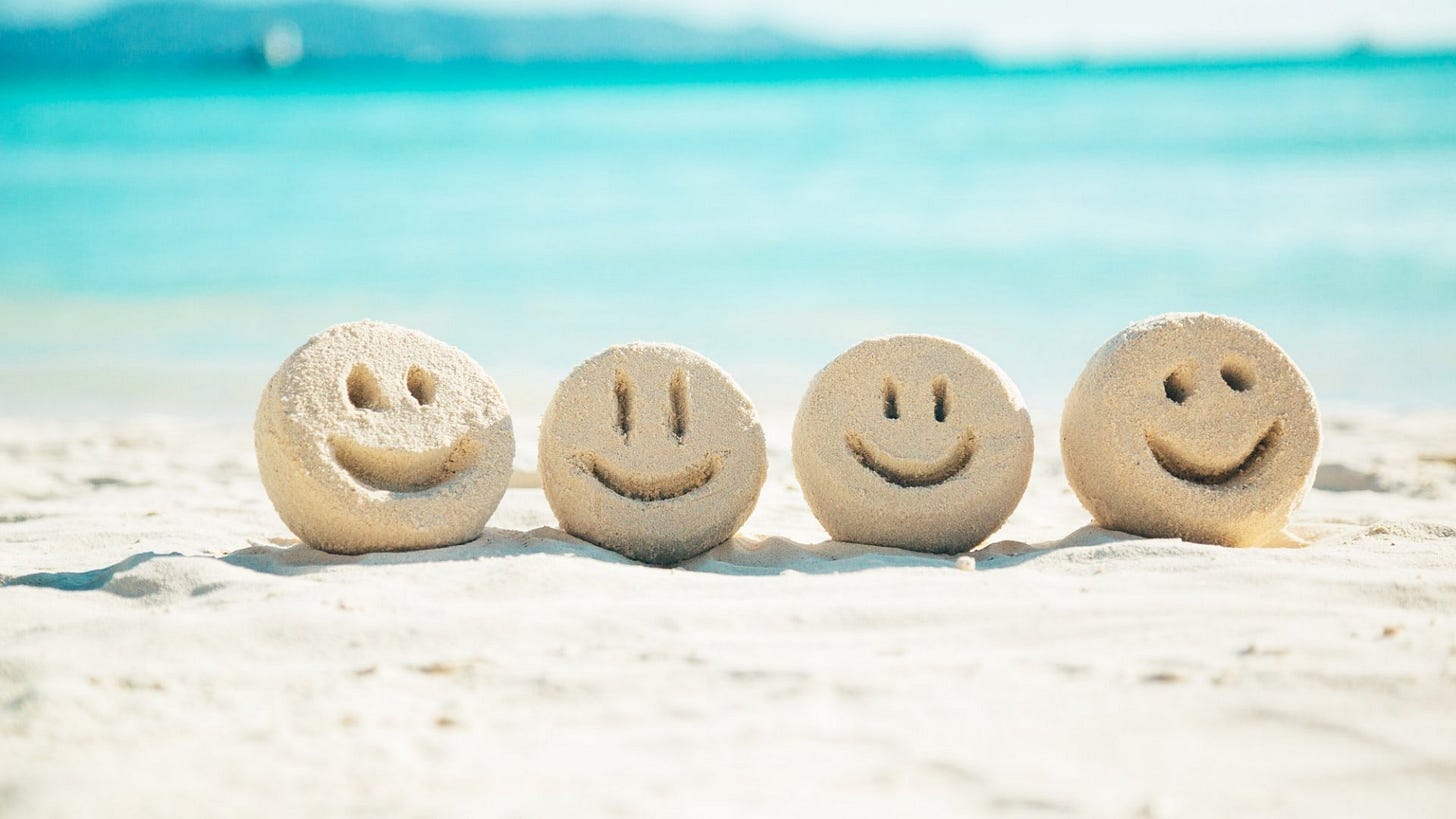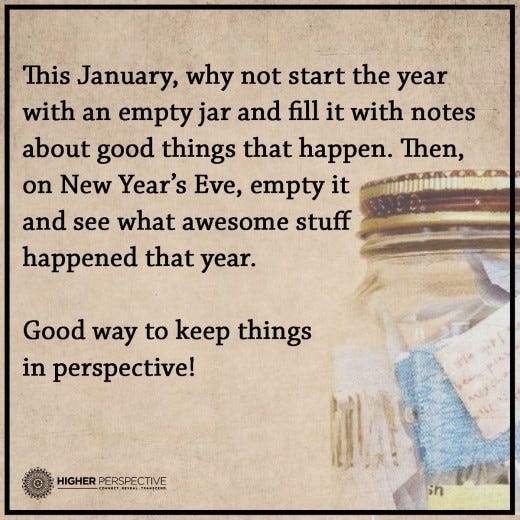A few days ago, I stayed indoors all day and found myself feeling a little blue by evening. I tend to get cabin fever pretty easily. It sneaks up on me, and then it’s hard to shake. But this time, I was also ruminating on some things I was worried about, so that accelerated it.
Sometimes, when I’m feeling down, I make a list of ten things I can do to feel better, things like taking a walk, calling a friend, reading a chapter from the book I’m currently reading … or getting dressed. Then, ideally, I do the things, and I feel better.
I know this kind of trickery works. I try to start each day with a little life hack—every morning, I ask myself several questions designed to put myself in a positive frame of mind. I always start with, “What am I grateful for today?”
This time, I was feeling a little more creative, so instead of a to-do list, I decided to think of three good things that had happened during the day. I’ll admit, I didn’t have high hopes going in. I wasn’t feeling blue for no good reason, right? I had cause to be upset. There were some valid concerns I was stewing about. But after coming up with three pretty amazing things that had transpired during the day, I realized I’d been focusing only on the negative and discarding the positive.
This reminded me of something I tried about 10 years ago. I kept a “Happiness Journal” for a year. At the end of each day, I wrote down a few of the best things that had happened during the day. It was an effective way to train myself to focus more on the positive.
Here are some of the things I listed in my Happiness Journal the first month:
I bought a brand new pair of black knee high boots for $21.80 by combining coupons and a sale.
I ran into an old friend I hadn’t seen for many years.
I went out for banana & pecan waffles with my daughter.
I went to a hockey game with my entire family—I was so proud to see my oldest son making an appearance and interacting with fans for charity and my youngest son going outside his comfort zone to be there for his family.
I found all my old tax returns, which I thought I’d accidentally thrown away.
I had a sleepover with one of my grandchildren, and we went out for blueberry pancakes the next morning.
I booked the entertainment and raised $25,000 in cash and in-kind sponsorships for a non-profit event.
I got a lot of writing done.
I watched the rain outside my window while I was cozy indoors sipping coffee and writing—so peaceful!
I went to a cooking class with my daughter.
Keeping the Happiness Journal that year made a big difference in the way I looked at things. My life began to look pretty incredible, and I felt happier. What was really interesting, though, was realizing that the increased happiness and positivity made me feel a little more resilient too. When a crisis hit midway through my first month of keeping the journal, I noticed I felt more positively about getting through it. It felt less like a curse—“Life sucks, why does something bad always happen to me?”—and more like a natural part of life—“Life is generally great, but bad things are going to happen sometimes, and we just have to get through the bad things and move forward.”
During those worst few days, when I was struggling to find some happiness, I noticed that I fell into a habit of writing down things in my happiness journal that were not so much things that made me happy, but things I’d accomplished during the day. I made an effort to reverse that—I didn’t want my happiness to be dependent on things that happened by chance, but I didn’t want it to be dependent on my accomplishments either. I wanted it to be more internal than external.
This got me thinking: What is happiness? Is happiness feeling like I’m doing well in life? Is it feeling well-liked? Is it feeling like I’m a good person? Is it a general feeling that things are going well? Like all of the elements of my life are in order, I’m on track in life, and all the people I love are okay?
“Happiness” studies have shown that how happy we are is determined by three factors:
genetics: some people are genetically predisposed to being happier than others.
circumstances: the circumstances of our lives contribute to how happy we are, including things like where we live, job security, income, and health.
action: the things we do, including activities and daily wellness practices, affect our happiness.
What I found the most interesting is that circumstances only contribute about 10% to our overall happiness, but circumstances are where we focus most of our efforts to be happy. About half of our tendency to be happy is made up of our genetic predisposition to be happy or unhappy. The other half is made up of the things we do … things like keeping a Happiness Journal.
During the experiment of keeping a Happiness Journal, I began to see that happiness isn’t something tangible. It’s made up of a lot of things, including frame of mind and lifestyle. And we can do things that make us happier.
Another thing I noticed during the year I kept the Happiness Journal was that some of the good things I’d put out into the universe during the good days circled back or came into fruition, sprinkling a little happiness into even the darkest days. I also noticed some of the things that made me unhappy, things like letting people down, not eating right, and not getting enough sleep or exercise. In a sense, then, happiness is not being unhappy.
Last, I took note of the kinds of things that made me happy:
Spending time with my family.
Following through on my commitments.
Connecting with friends.
Pleasant memories, especially memories of my mom and dad.
Helping family members, especially being there for my children and grandchildren.
Making progress toward my goals.
Accomplishing big tasks and crossing things off my to-do list.
Writing more.
Contributing to my community.
Feeling like I’m making a difference in the world.
Wearing cute outfits.
“To look good is to feel good.”
—Billy Crystal
I began making an effort to do more of the kinds of things that made me happy.
Recently, it struck me that I could apply this kind of journaling to other things in my life, too, like my writing career, which is one of the reasons I wanted to share this idea with you. Pursuing a writing career can be discouraging—it’s filled with a lot of rejection. But what if we keep a journal of all the good things that happen along the way, so we can not only focus on the positive but see that we are making progress?







I love this topic. I've also been seeking what truly makes me happy. It helps cut through the false narratives we tell ourselves about the world and us. These journals take the blinders off. I've also been trying to see situations, even ones that seem like bad experiences, as opportunities to learn and practice being my ideal self rather than focusing on how they negatively impact me.